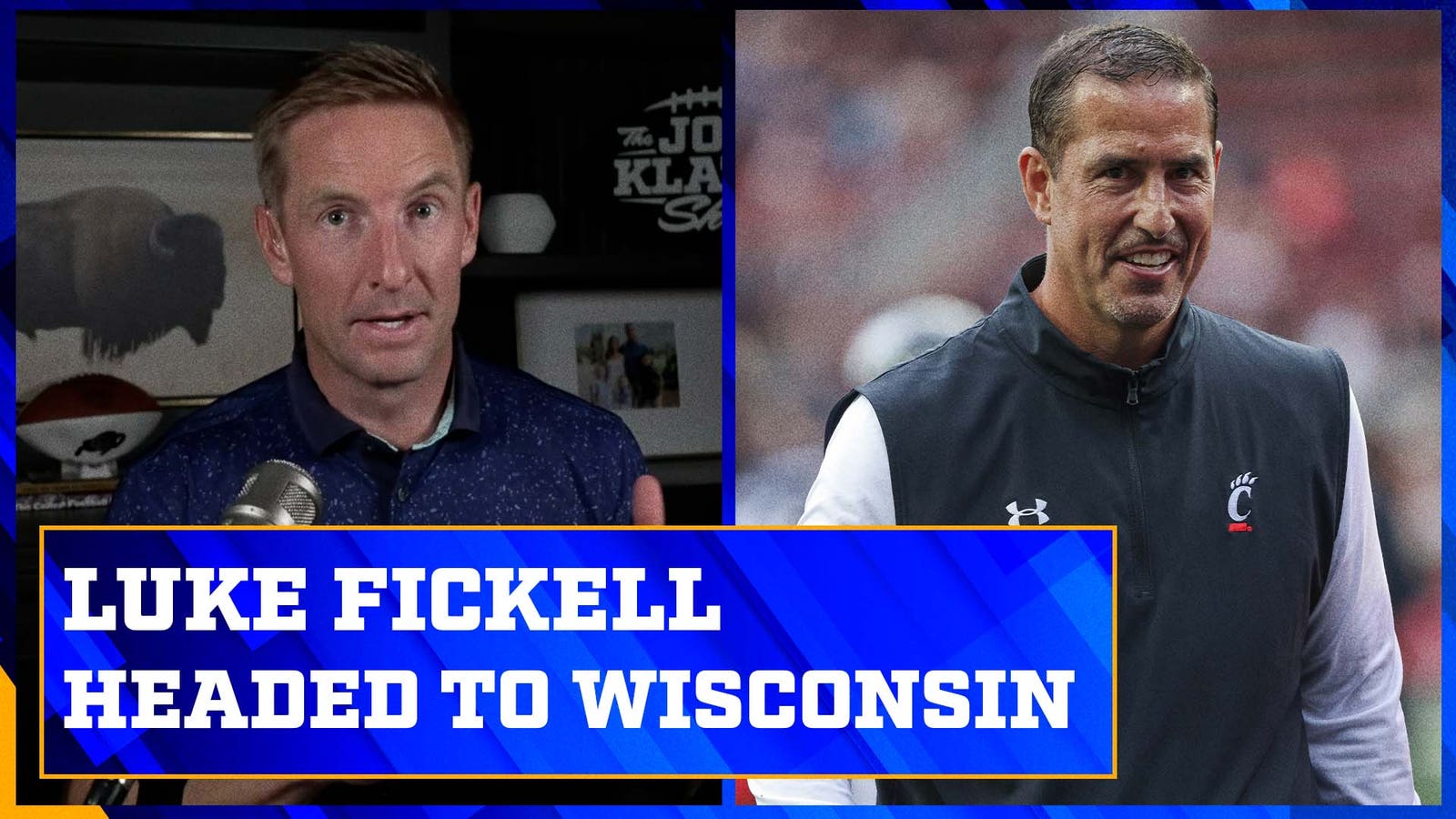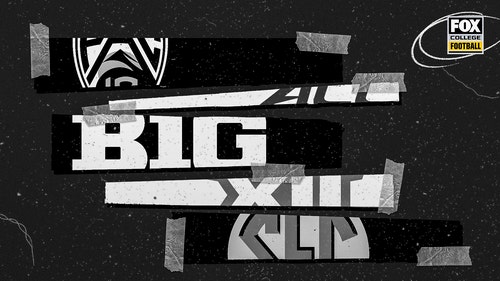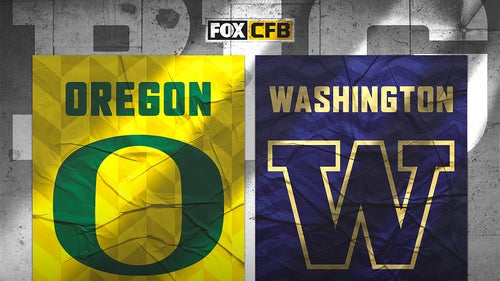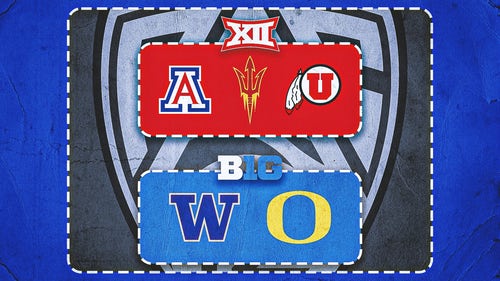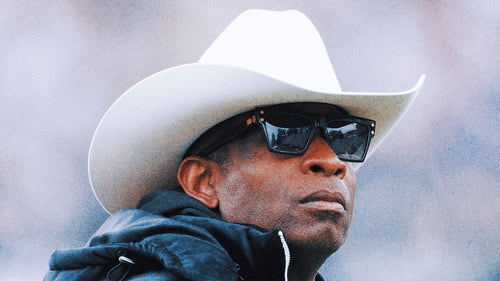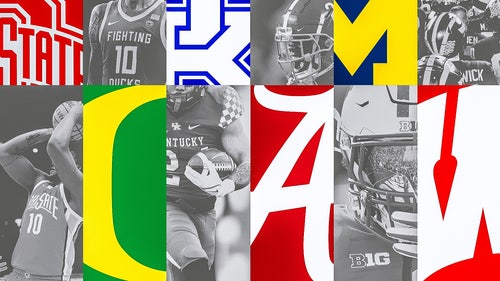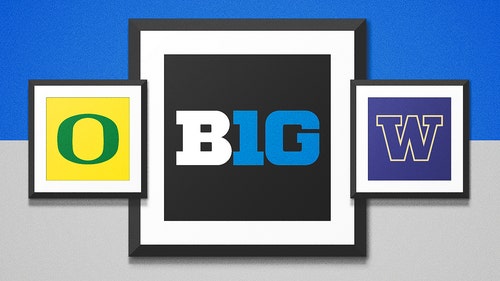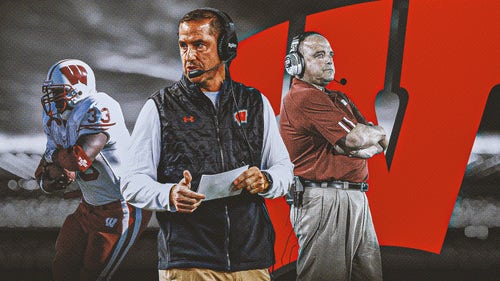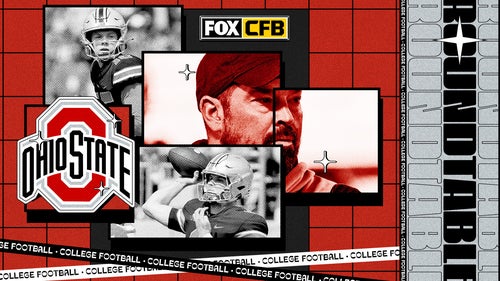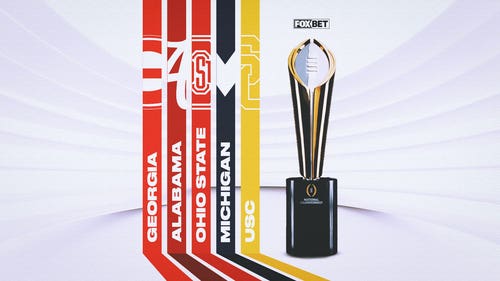

Luke Fickell's Wisconsin vision: Protect the past while charting a new course
MADISON, Wis. — Two stories below Luke Fickell's sprawling office is an understated trophy case that preserves the identity of Wisconsin football. The three-tiered vertical shrine was built into the lobby wall of the Stephen M. Bennett Student-Athlete Performance Center. It sits a few paces from the main welcome desk and a few more from the program's 90-yard indoor practice field.
From left to right, the cabinet's top shelf includes a framed photograph of former head coach Barry Alvarez and his first Rose Bowl-winning team; a Wisconsin helmet with an old Bowl Championship Series logo affixed to the rear; and a commemorative football celebrating the Badgers as Rose Bowl Champions.
Beneath the helmet hangs a screen-printed white towel that immortalizes one of the greatest players in Wisconsin history — perhaps the greatest running back in college football history — who's become a rumbling embodiment of everything Alvarez built and the unshakeable legacy he's left behind. The towel is dated Nov. 13, 1999, to honor the day that tailback Ron Dayne, who ran for more than 7,100 yards over four seasons and would be awarded the Heisman Trophy a few weeks later, broke the NCAA record for career rushing yards.
"I just remember the tradition of going to my grandparents' (house) every New Year's Day to watch the Rose Bowl," former Wisconsin quarterback Scott Tolzien said. "And I specifically remember the Ron Dayne Rose Bowl when he ran all over UCLA. That painted a picture of the program for me: blue-collar mentality, impose their will on teams."
Ever since 1990, when Alvarez took over a program that had won nine games the previous four years combined, the perpetuation of a brawny, bruising, bulldozing ground attack had become synonymous with Wisconsin. And after Alvarez retired to become the school's athletic director, in 2005, two of the next three coaches he hired were direct descendants of his coaching tree: Bret Bielema and Paul Chryst. They extended a three-decade run that featured six Big Ten titles, more than a dozen 10-win seasons and enough draft picks along the offensive line (31) and out of the backfield (13) to speckle NFL rosters. But the ultimate goal of winning the school's first national championship remained out of reach.
And it didn't seem to be getting any closer under Chryst. The beloved ex-Wisconsin quarterback averaged 10.4 wins per season from 2015-19 before his recruiting began to slip and his offense grew stale. Athletic director Chris McIntosh made the decision to fire Chryst last October and set in motion a national search that opened the door for change, for someone with no connections to Alvarez or Wisconsin to take the program in a new direction.
"That necessitates that I go out and try to find the very best coach that I think can do that for us," said McIntosh, a former Wisconsin offensive lineman. "That's been the priority for me. In the case of football, that led me to Luke."
At 49, Luke Fickell had become the coaching carousel's white whale. The former Ohio State nose tackle and longtime Ohio State assistant dazzled as a first-time head coach at Cincinnati. He'd won at least nine games in five of his six seasons and became the first coach to reach the College Football Playoff with a school from outside the Power 5 conferences.
Still, the challenge he faces in Madison is immense, both on and off the field. It falls on Fickell to marry the tradition Alvarez built with an offense that can carry the Badgers into the modern era; to maintain the in-state recruiting pipelines that bolster the roster while supplementing local talent with high-level skill players across the country; to convince the players, alumni and fans that his vision will work as he tweaks the program's renowned ethos.
"I think you've got to figure out what is special about the place, embrace it and then put the things that are important to you into the environment and culture," Fickell said.
*** *** ***
Last summer, Mabrey Mettauer and his father planned an unofficial visit to Wisconsin. The four-star quarterback from The Woodlands, Texas, a suburb of Houston, had received a scholarship offer from Chryst and his staff a few months earlier, in June, a month in which Ole Miss, Colorado and Cincinnati — then coached by Fickell — also threw their hats into his recruitment.
The Mettauers traveled to Madison in early September for a Badgers' home game against Washington State. Wisconsin lost, 17-14, after failing to score in the second half. But Mettauer enjoyed the experience anyway — with one noteworthy exception.
"I loved the city, I loved the college feel to it," Mettauer said. "But I didn't like the offense. It had everything but the offense."
An inability to consistently attract high-level quarterbacks has been a thorn in Wisconsin's side since the '90s, an unfortunate byproduct of the program's schematic choices. Not a single Wisconsin quarterback was drafted between 1989-2002 as the run-pass imbalance made recruiting elite passers something of a fruitless exercise. There were additional draft droughts from 2005-11 and 2013-present, with future Super Bowl winner Russell Wilson, a third-round pick in 2012, the last Badger to hear his name called.
Wilson remains the school's only quarterback to throw for more than 3,000 yards in a season over the last 30 years, and never in the program's history has a quarterback been selected in the first or second round.

Barry Alvarez built an unshakable legacy at Wisconsin based on toughness, quality line play and a strong running game. However, that legacy has not produced a national title. (Photo by Jonathan Daniel /Getty Images)
"You've got to be able to lure a marquee quarterback somewhere along the line," said Brad Childress, who worked on Alvarez's staff for eight seasons and was the offensive coordinator from 1994-98. "I'm trying to think who even came close for us."
That's why Fickell's choice for the program's new offensive coordinator — Phil Longo of North Carolina — is so critical. Though Fickell and Phil Longo had never worked together, they began crossing paths at coaching clinics in the last handful of years. Their initial conversations were mostly about Xs and Os because Fickell had studied Longo as a potential candidate for his first staff with the Bearcats. But as the discussion expanded to more personal topics, like family values, the two realized they shared a fairly strong connection. Fickell told Longo he would call him if or when a job opening materialized.
Longo, 55, made the jump to Madison after four seasons in the same role with the Tar Heels, where his latest pupil, former five-star quarterback Drake Maye, is the potential No. 1 overall pick in the 2024 NFL Draft. Longo derived his Air Raid system from the late Mike Leach after the two met at a coaching clinic in the '90s, and from there he honed his version, which includes wrinkles from the Kansas City Chiefs, across offensive coordinator stints at La Salle, Minnesota Duluth, Southern Illinois, Slippery Rock, Sam Houston State, Ole Miss and North Carolina.
And while Longo's spread formations and blending of tempos might widen the eyes of longtime Badger admirers, his passing attacks have finished with an average national ranking of 18th in six years as a Power 5 coordinator. (It's also worth noting his system accommodated two 1,000-yard rushers with the Tar Heels in 2020, something Wisconsin tailbacks Braelon Allen and Chez Mellusi are hoping to repeat this season.)
"Now it has the offense and the cool town, you know?" said Mettauer, who eventually committed to Wisconsin after initially planning to join Longo at North Carolina.
With Mettauer still a year away from college, Longo wasted little time in fortifying the Badgers' existing quarterback room. He secured commitments from three high-profile transfers within five weeks of his arrival: first came Nick Evers from Oklahoma (No. 172 overall, No. 9 QB in 2022); then Tanner Mordecai from Southern Methodist (No. 249 overall, No. 11 dual-threat QB in 2018); and finally Braedyn Locke from Mississippi State (No. 383 overall, No. 22 QB in 2022). The expectation is that Mordecai, who threw for more than 7,000 yards and 72 touchdowns over the last two seasons, will step into the starting role.
But Fickell and Longo aren't the first head coach-offensive coordinator pairing to arrive at Wisconsin with the goal of introducing significant change. In 2013, after Bielema had left for Arkansas, Alvarez hired Gary Andersen for what amounted to a brief, two-year run. Andersen came to Madison after improving Utah State from a four-win team in 2010 to an 11-win team in 2012. The Aggies, he said, had run a spread offense approximately 85% of the time.
And that was Andersen's intention with the Badgers, for whom he hired offensive coordinator Andy Ludwig (now at Utah) and signed the No. 1 dual-threat junior college quarterback in the country. But Wisconsin's depth of talent at running back, tight end and offensive line prompted the coaching staff to adjust. The backfield trio of Melvin Gordon, James White and Corey Clement combined for 3,600 rushing yards and 34 scores on a team that finished 9-4.
"We did run some spread," said Andersen, who guided Wisconsin to the Big Ten title game in 2014 before leaving to become the head coach at Oregon State. "But if I sat back and said, hey, when we won the big games that we had to win in our time at Wisconsin, we relied on the big ground and pound, the traditional Wisconsin offense."
*** *** ***
Matt Harris didn't bother with an international calling plan when he traveled to Mexico four years ago. The head football coach at Waukesha North High School in Waukesha, Wisconsin, a western suburb of Milwaukee, simply turned his service off and relaxed.
A few days later, after Harris flipped his phone back on, he noticed a voicemail from one of the best players on his team: four-star wideout Chimere Deke, who for years had spoken about how much he loved the Badgers. Dike wanted his coach to know he'd just committed to Wisconsin.
"He was like, ‘Hey Coach Harris, just so you know, I know we wanted to talk about this, but I knew I was going to Wisconsin from the second they offered me,'" recalled Harris, who is now the head coach at Arrowhead High School, another suburban Milwaukee powerhouse.
Such devotion to the Badgers is the norm in Wisconsin, which, despite being the 25th-largest state by land area, has but a single Division I program. Nearly every high school football player dreams of playing in Madison after growing up regaled with stories about Alvarez's greatness and the sustained success that followed. The No. 1 prospect in the state has signed with the Badgers 11 of the last 12 times Wisconsin extended a scholarship offer. That includes Fickell's first recruiting class, in 2023, when he plucked three-star tailback Nate White from Rufus King in Milwaukee.
No position has stronger in-state ties than the offensive line, where the NFL pedigree predated Alvarez but was quickly embraced once he arrived. He realized the state's ability to "grow a lot of really big guys" meant he could develop the kind of road graders necessary to execute a run-heavy scheme. Alvarez compared offensive line play to fist fights and implored his players, whom he described as his "lunch-pail gang," never to flinch. The efficacy of that position group across 30 years has paved the way for a staggering 28 1,000-yard rushers and five 2,000-yard rushers: Melvin Gordon in 2014; Jonathan Taylor in 2018 and 2019; Ron Dayne in 1996 and 1999.

Ron Dayne rushed for an NCAA-record 7,125 yards in four seasons at Wisconsin. Four other Badgers rank in the top 50 all-time: Jonathan Taylor (sixth), Montee Ball (19th), Melvin Gordon (33rd) and Anthony Davis (47th). (Photo by John Biever/Icon Sportswire via Getty Images)
"You knew you were going to run the ball when you went to Wisconsin," said John Moffitt, a former two-time All-Big Ten lineman for the Badgers. "You wanted to run the ball when you went to Wisconsin."
Seven of the 17 ex-Badgers taken in the first round of the NFL Draft from 1990-present were offensive linemen, and six of them were in-state recruits: McIntosh, Gabe Carimi, Joe Thomas, Kevin Zeitler, Travis Frederick and Ryan Ramczyk. They personified Alvarez's recruiting strategy of building a wall around the state and supplementing the local core with talent from places like New Jersey and Florida. The last Wisconsin-born offensive lineman to be selected in the first round without playing for the Badgers was former Stanford tackle Gordon King in 1978.
Within two days of being hired, Fickell had boots on the ground at Arrowhead. He impressed Harris by wearing a simple sweatsuit and driving what appeared to be his own truck, sans entourage or handlers, and with a demeanor that suggested Fickell was genuinely excited to be there. He detailed a recruiting strategy that prioritizes players within a three-hour radius of Madison, just like Alvarez did, and Fickell's pitch has appealed to plenty of high school coaches with longstanding ties to the program.
"From that moment," Harris said, "I felt really good about who the guy was as a person."
The message appears to be resonating with high schoolers and college players alike. In his 2023 recruiting class, Fickell supplemented a modest collection of high school prospects with the nation's 24th-best transfer portal haul, a group headlined by Mordecai and former USC wide receiver CJ Williams, the No. 73 overall recruit and the No. 10 wide receiver last year. Only Michigan had a higher-rated batch of transfers among Big Ten schools.
His 2024 class has climbed to 21st nationally after gaining six commitments in July alone. He's offset several unexpected in-state misses by landing a handful of four-star prospects from other parts of the country: two from Pennsylvania, two from Illinois and one each from Maryland, Minnesota and Texas.
"The level of talent that Fickell is able to recruit," Carimi said, "is unprecedented to what we've had in the past."
*** *** ***
The roots of Fickell's recruiting philosophy can be traced to former Ohio State coach John Cooper, who sat in the Fickell family living room and delivered a speech he repeated in homes across the country. Cooper's son had turned down better scholarship offers from Tennessee and Kentucky to play for his father at Tulsa, and Cooper promised the mothers of high school prospects that he'd treat their sons the same way he treated his own.
Melding football with family has become a guiding principle for Fickell, who spent the first 24 years of his career working at Ohio State, then Akron, then Ohio State again, then Cincinnati, in part because the idea of uprooting his wife and children was unappealing. Fickell was so committed to his players at Akron that Buckeyes head coach Jim Tressel had to convince him to join the staff at Ohio State. And at Cincinnati, where the athletic department couldn't afford to pay assistants top dollar, Fickell's wife, Amy, routinely organized social events for the coaches' families to remind them that money isn't everything. (The Fickells have six children, including two sets of twins.)
"I would put Luke Fickell right probably at the top, certainly in the top 10, of players I coached in terms of doing the right things," Cooper said.
Doing the right thing has meant learning about and embracing Wisconsin's past, the importance of which was imparted on him by Tressel during their time at Ohio State. Tressel was unfamiliar with Fickell when he began searching for a new special teams coordinator in 2002, but hiring someone with ties to Cooper, who had won three Big Ten titles the decade prior, was his primary concern. His own defensive line coach, Jim Heacock, raved about Fickell's competitiveness and character after he started 50 straight games for the Buckeyes between 1993-96. Tressel interviewed Fickell and agreed, calling the decision "a no-brainer."
The addition of Fickell meant Tressel's staff had coaches linked to nearly every era of Ohio State football, from Woody Hayes to Earle Bruce to Cooper, and that kind of deferential environment became central to Fickell's understanding of how to build a program. It allowed him to grasp the essence of everything Wisconsin football represented, from the Alvarez and Bielema eras to Chryst and interim coach Jim Leonhard, another adored alum. And it became a significant factor in his decision to take the job.
"I think the thing that really made it a no-doubter for him," Tressel said, "was the great respect he had for Wisconsin."
Fickell's reverence and acceptance of the program's tradition resonated with McIntosh, his new boss and a consensus All-American offensive tackle for the Badgers. Removing Chryst had been agonizing for McIntosh, who starred for Wisconsin less than a decade after Chryst won three varsity letters there. McIntosh was raised an hour east of Madison in Pewaukee, Wisconsin, a suburb of Milwaukee. And like so many others, he'd grown enamored with Alvarez's '93 team and hung a photo of the starting offensive line on his bedroom wall.

Wisconsin Athletic Director Chris McIntosh was an All-America lineman for the Badgers who would become a first-round NFL draft pick. (Getty Images)
That season, which coincided with McIntosh's junior year of high school, cemented his desire to join the pantheon of Wisconsin linemen venerated the way most fan bases glorify quarterbacks. And it was his membership to this exclusive group that afforded McIntosh, an eventual first-round pick, the benefit of the doubt among his brethren after firing Chryst.
"Chris was one of the guys I watched growing up in the 90s," Carimi said. "And I have great admiration and respect for Chris and him wanting to do the right thing for Wisconsin."
Understanding the nuances of Wisconsin's football fraternity is something Fickell embarked on last November, during his first month on the job, while Leonhard guided the team through bowl practices. He walked through the facilities with former players to pick their brains about moments and individuals honored on the hallway walls. He spent time with Alvarez to learn more about the athletic department and university at large. And he assured McIntosh that Longo's new offense won't abandon the Badgers' trademark rushing attack.
"I'm thrilled," Alvarez said. "I think he's done all the right things."
*** *** ***
These days, even Tressel has experienced his old protégé's ceaseless recruiting pitches. Every time he and Fickell speak on the phone, their conversations consist of one former Buckeye imploring another to visit the campus in Madison.
"All he talks about," Tressel said, ‘is, ‘Coach, you've got to come up here. These are the greatest people in the world. You've got to feel this place a little bit more than just coming in as an opposing coach.' He said, ‘Man, this is a special place.'"
"So you can see that he's sold," Tressel continued. "Now it's going to take time for Wisconsin to decide that they're sold. And you can't do that overnight."
Which, of course, is true. The goodwill Fickell has generated by opening his practices to high school coaches and alums, by genuflecting to Alvarez's institutional knowledge, by demonstrating he can bring high-caliber recruits to campus, by authorizing a YouTube series that gives fans a peek behind the curtain — all those things can only take him so far. Winning the offseason doesn't guarantee real wins this fall, though the Badgers are among the favorites in the Big Ten West.
Fickell unspools his vision from an office atop Camp Randall Stadium, two floors above the trophy case that salutes Wisconsin's identity. He's leading the program into the future while Dayne safeguards the past.
"We all want the same thing," McIntosh said. "We want to have the best chance of being successful here and of winning championships here."
Michael Cohen covers college football and basketball for FOX Sports with an emphasis on the Big Ten. Follow him on Twitter at @Michael_Cohen13.








.jpg?downsize=56%3A*)































































.jpg?downsize=56%3A*)











































.jpg?downsize=56%3A*)
















.jpg?downsize=56%3A*)








